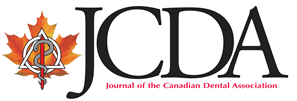 |
Current Issue | Subscriptions | ||||||
| Back Issues | Advertising | |||||||
| More Information | Classified Ads | |||||||
| For Authors | Continuing Education | |||||||
|
||||||||
 |
|
Oral Health Care in Canada A View from the TrenchesFULL TEXT
Patricia Main, BDS, DDS, DDPH, MSc, FRCD(C) A b s t r a c tPurpose: Concern is increasing over the effect of lack of access to oral health care on the oral health, and hence general health, of disadvantaged groups. In preparation for a national symposium on this issue, key informants across Canada were canvassed for their perceptions of oral health services and their recommendations for improving oral health care delivery. This paper reports the results of that survey. Method: A questionnaire was constructed to address problems facing agencies with responsibility for meeting the oral health care needs of people receiving government assistance, the underhoused and the working poor. The survey was sent to 200 agencies, government and professional organizations. Data from the returned questionnaires were entered into a Statistical Package for the Social Sciences database and analyzed. Responses from Ontario were compared with those from the rest of Canada, those from government organizations were compared with others and results were examined by cultural nature of clients and by type of organization. Results: In assessing the positive aspects of oral health care, 84% of respondents agreed that public programs were useful and 81% felt that dentists offer good care. However, 77% disagreed that preventive care is accessible and that access to dentists and dental specialists is easy. More Ontarians than others thought that there are few alternative settings for care delivery (95% vs. 83%) and that the poor feel unwelcome in dental offices (83% vs. 70%). The issues most commonly identified were the need for alternative delivery sites, such as community health centres where service delivery could be affordable, accountable and sustainable; the need for oral health to be recognized as part of general health; regulatory issues (e.g., expanding practice opportunities for non-dentist oral health care providers and removing restrictions on other dental health professionals in providing basic care to the financially challenged); and training. Discussion: The survey helped to identify access and care issues across the country. There was considerable agreement that lack of access to dental care services is an important detriment to the oral and general health of many Canadians. Respondents believe that dental health is isolated from general health.
MeSH Key Words: Canada; dental health services; health services accessibility/trends; vulnerable populations
Reply to this article | View replies [0]
|
|
|
Full text provided in PDF format |
|
| Mission Statement & Editor's Message |
Multimedia Centre |
Readership Survey Contact the Editor | Fran็ais |
|